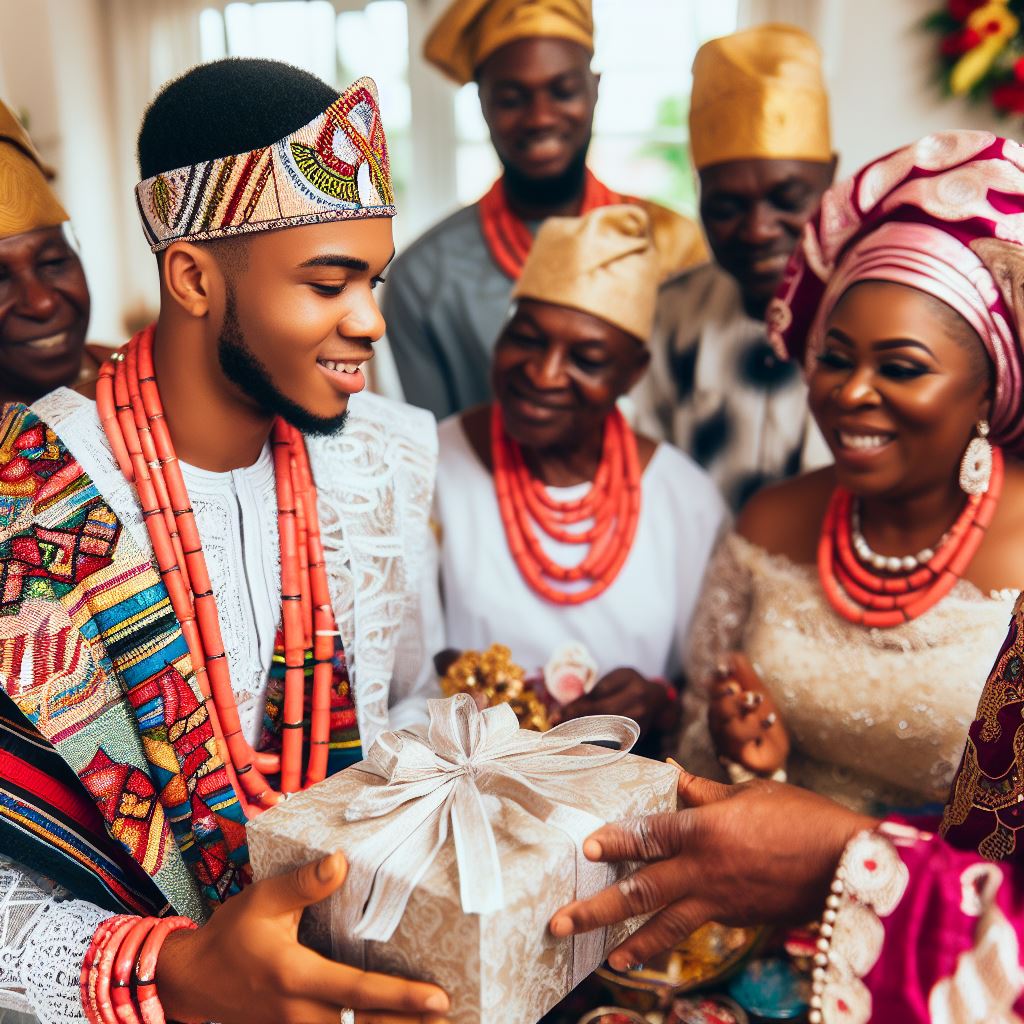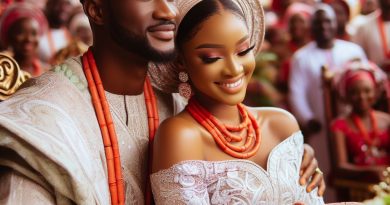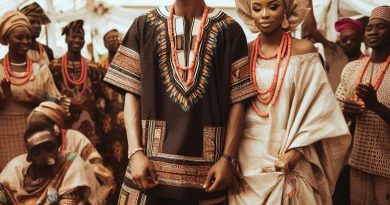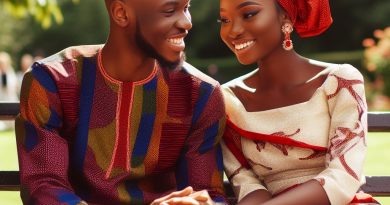Understanding the Deep Roots of Marriage in Nigeria
Last Updated on October 17, 2023
Introduction
Marriage in Nigeria possesses deep roots that require thorough understanding of its cultural and historical background.
It is essential to comprehend these roots as they shape the institution of marriage in the country.
By exploring these roots, we can gain insight into the customs, traditions, and societal expectations that surround Nigerian marriages.
It is through this understanding that we are able to appreciate the significance of marriage in Nigerian society and its role in shaping individuals’ lives.
In this blog section, we will delve into the deep roots of marriage in Nigeria, exploring its history, cultural significance, and the factors that have contributed to its resilience over time.
By gaining this understanding, we hope to provide readers with a comprehensive view of the institution of marriage in Nigeria and its enduring importance.
So join us on this journey as we uncover the rich tapestry of Nigerian marital traditions and their impact on contemporary society.
Historical perspective
The Origins of Marriage Practices in Nigeria
Marriage in Nigeria has deep historical roots, intricately woven into the fabric of diverse ethnic groups and cultures.
Traditional practices vary across Nigeria’s numerous tribes, each with its unique customs.
Traditional Marriage Rituals and Ceremonies
Marriage rituals often involve elaborate processes, such as the payment of dowries, exchange of gifts, and the observance of age-old customs.
These ceremonies reinforce the unity and identity of the respective tribes.
Influence of Colonialism on Marriage Customs and Traditions
The colonial period introduced significant changes to Nigeria’s marriage customs. British colonial rulers imposed their values and religious beliefs, which affected local practices.
Christianity and Islam played pivotal roles in reshaping marriage traditions.
Despite colonial influences, many traditional customs endured and continue to be celebrated today.
The post-colonial era has seen a resurgence in pride for these customs as they represent cultural identity and heritage.
Understanding the historical perspective of marriage in Nigeria is essential to appreciate the depth and significance of these customs.
It showcases the resilience and adaptability of Nigerian cultures in the face of external influences.
In modern Nigeria, the coexistence of traditional and contemporary marriage practices illustrates the dynamism of this vibrant nation.
Read: The Beauty of Commitment: Analyzing Nigerian Vows
Traditional marriage customs
Traditional marriage customs in Nigeria vary among the diverse ethnic groups present in the country. These customs reflect unique cultural practices and beliefs that have been passed down through generations.
Here are some of the most notable customs:
Diverse ethnic groups and their unique customs
- Yoruba: The Yoruba ethnic group, which is one of the largest in Nigeria, places great importance on family and extended kinship ties.
In Yoruba traditional marriages, the families of the bride and groom play significant roles.
The groom’s family pays the bride price, known as “owo ori,” to the bride’s family as a symbol of appreciation and respect. - Igbo: In Igbo culture, marriage is seen as a union not just between two individuals, but between two families.
The bride price, called “igba nkwu,” is an essential element of traditional Igbo marriages. It serves as a means of honoring the bride’s family and validating the marriage. - The Hausa and Fulani in Northern Nigeria widely practice polygamy, with men needing consent from the first wife.
- Ibibio: Ibibio traditional marriages involve the groom paying a bride price, “mbom,” symbolizing his readiness and ability to care for the bride.
- Tiv: Among the Tiv ethnic group in Benue State, marriage celebrations are community events.
The groom’s family pays the bride price, referred to as “kwase u utyondo,” to the bride’s family as a token of appreciation.
The entire community comes together to witness the marriage ceremony, which is usually accompanied by traditional dances and feasting.
Read: Marital Contracts and Agreements: Insights from Nigeria’s Marriage Act
Religious influence
Explore the impact of major religions like Christianity and Islam on marriage in Nigeria
Religious influence on marriage in Nigeria is significant and plays a crucial role in shaping marital relationships in the country.
Both Christianity and Islam have a deep-rooted impact on the institution of marriage.
Christianity, which arrived in Nigeria through European missionaries, has become one of the major religions in the country.
These beliefs and practices have influenced how people conduct marriages, reflecting Christian weddings as sacred unions affirmed before God.
Contrast traditional customs with religious beliefs and practices
Contrasting traditional customs with religious beliefs, there are notable differences in wedding ceremonies.
Traditional marriages in Nigeria have diverse practices depending on the ethnic group, such as the Igbo, Yoruba, or Hausa.
These customs often involve elaborate rituals, bride price negotiations, and the involvement of extended family members.
However, with the introduction of Christianity, many Nigerians have embraced the Christian wedding ceremony as the primary form of marriage.
This has brought about a fusion of traditional customs with Christian values.
For example, couples may incorporate some aspects of their traditional customs into the Christian wedding ceremony, such as wearing traditional attire or performing traditional dances.
Sharia law governs Islamic marriages, defining the rights and responsibilities of spouses, including permission for polygamy.
Both Christian and Islamic teachings stress the significance of maintaining the marital bond.
They discourage adultery and divorce, promoting reconciliation and forgiveness during marital conflicts.
How religious laws and teachings govern marital relationships
Furthermore, religious laws and teachings have a significant influence on issues such as gender roles within marriage.
In many traditional Nigerian societies, men are seen as the head of the household, responsible for providing for their families.
Religious teachings can reinforce or challenge these traditional gender roles by emphasizing the importance of mutual respect, love, and partnership within marriage.
The impact of Christianity and Islam on marriage in Nigeria cannot be underestimated.
From shaping wedding ceremonies to guiding marital relationships, religion plays a central role in the deep roots of marriage in Nigeria.
It is a complex interplay between traditional customs and religious beliefs, with each influencing and shaping the other.
Religion provides a moral framework and guidance for couples, emphasizing the sanctity of marriage and the importance of working towards a lasting union.
As Nigeria continues to evolve, the religious influence on marriage will continue to be a fundamental aspect of Nigerian society.
Read: Child Custody and Maintenance Post-Divorce: Nigeria’s Laws Explained

Changing dynamics
Shift towards more modern and Westernized approaches to marriage
Several factors have influenced the changing dynamics of marriage in Nigeria.
A significant shift involves adopting more modern and Westernized marriage approaches.
People are replacing traditional rituals with court and church weddings, viewing them as global trend-aligned alternatives.
Globalization and urbanization have played a major role in these changing dynamics.
As Nigeria becomes more connected to the global community, there has been an increase in the adoption of Western wedding practices.
Young couples are prioritizing individualism and personal choice, opting for weddings that reflect their own values and preferences.
Rise of court and church weddings as alternatives to traditional rituals
People favor court weddings for their efficiency and convenience, appreciating the government’s recognition of this legal process.
It provides couples with legal rights and protections, ensuring that the marriage is legally binding. Court weddings also offer a more secular option for those who do not adhere to religious traditions.
Church weddings have also seen a rise in popularity. Many Nigerians are embracing Christianity, and church weddings provide an opportunity to celebrate their faith while uniting in marriage.
These weddings often follow a combination of traditional and Western customs, incorporating religious rituals and practices.
Influence of globalization and urbanization on marriage practices
The influence of globalization is evident in the increasing popularity of destination weddings.
Couples are opting to celebrate their marriages in exotic locations, combining traditional Nigerian customs with global trends.
This trend symbolizes a desire to showcase their love and commitment on a global stage, often with a touch of luxury and extravagance.
Urbanization has also impacted marriage practices in Nigeria. As more people migrate to cities, they are exposed to diverse cultures and new ideas.
This exposure leads to a reevaluation of traditional practices and a willingness to embrace different approaches.
The urban environment fosters a sense of individualism and freedom, allowing couples to create their own unique wedding experiences.
In addition to these changing dynamics, it is important to acknowledge the enduring significance of traditional marriage rituals in Nigeria.
While some couples are moving away from these customs, many still find value in the connection to their cultural heritage. Modern ceremonies blend with traditional rites to honor ancestors and preserve cultural identity.
Overall, the deep roots of marriage in Nigeria are experiencing a shift towards more modern and Westernized approaches.
Globalization and urbanization drive this change, promoting personal choice and individualism.
While traditional rituals hold significance, court and church weddings are viewed as trend-aligned alternatives.
The evolving dynamics of marriage reflect the changing values and priorities of Nigerian couples as they navigate the complexities of a modern and interconnected world.
Read: Building Financial Synergy in Nigerian Marital Homes
Challenges faced
Some common challenges faced by married couples in Nigeria
Married couples in Nigeria face a multitude of challenges, many of which are deeply rooted in cultural and societal norms.
These challenges include:
- Financial pressure: Nigeria is a country where economic stability is hard to come by, and financial strain often puts a significant strain on marriages.
- Family interference: In Nigeria, it is common for extended family members to exert influence and interfere in the decisions and dynamics of a couple’s marriage.
- Infertility: Infertility is considered a significant challenge, as having children is highly valued in Nigerian society and can often lead to marital discontent.
- Communication barriers: Lack of effective communication can result in misunderstandings, conflicts, and an overall breakdown in the relationship.
- Domestic violence: Cases of domestic violence are unfortunately prevalent in Nigeria, where cultural norms sometimes tolerate or even condone such behavior.
- Religious differences: Nigeria is a diverse country with various religious affiliations, and religious differences can strain interfaith marriages.
- Sexual issues: Nigerian society can be conservative, making it difficult for couples to discuss and address sexual issues, leading to dissatisfaction and tension in the relationship.
Gender roles and expectations within marriages
Nigeria is a country with deeply entrenched gender roles and expectations within marriages. These include:
- Traditional gender roles: Nigerian society often expects women to be submissive, prioritize childrearing, and manage the home.
- Unequal distribution of labor: Women are often burdened with household chores, child-rearing responsibilities, and sometimes even paid work, resulting in an unequal distribution of labor within marriages.
- Limited career opportunities for women: Gender discrimination in the workplace restricts women from achieving career success, leading to frustration and dissatisfaction within marriages.
- Pressure to conform: Both men and women face societal pressure to conform to traditional gender roles, making it challenging for couples to challenge or renegotiate these expectations.
- Limited decision-making power: Women often have limited decision-making power within marriages, leading to a lack of autonomy and dependence on their husbands.
- Double standards: Men are often afforded more freedom and societal acceptance when it comes to pursuing extramarital affairs or engaging in behavior seen as unacceptable for women.
Infidelity, divorce rates, and societal stigmas
Infidelity, divorce rates, and societal stigmas are interconnected challenges faced by married couples in Nigeria:
- Infidelity: Infidelity within marriages is a prevalent issue in Nigeria, influenced by factors such as financial instability, limited communication, and societal acceptance of extramarital affairs.
- Divorce rates: Divorce rates in Nigeria have been gradually on the rise due to several factors, including the empowerment of women, changes in cultural values, and increased individualism.
- Societal stigmas: Despite the growing number of divorces, societal stigmas surrounding divorce persist in Nigeria, making it difficult for individuals to leave unhappy or abusive marriages.
- Religion and culture: Religious and cultural beliefs play a significant role in stigmatizing divorce and viewing it as a failure, further perpetuating societal pressures to stay in unhappy marriages.
- Emotional and psychological toll: Dealing with infidelity, contemplating divorce, or being in a struggling marriage takes a toll on one’s emotional and psychological well-being.
Married couples face numerous challenges in Nigeria, including financial pressure, family interference, and issues concerning gender roles, infidelity, divorce rates, and societal stigmas.
These challenges call for open dialogue, cultural changes, and support systems to create healthier and happier marriages in Nigeria.
Conclusion
We have explored the deep roots of marriage in Nigeria and uncovered significant insights.
Firstly, we discovered the strong influence of cultural and traditional values, such as the concept of dowry and the importance of extended family involvement.
Secondly, we highlighted the role of religion in shaping marital practices, with Islam and Christianity playing a significant role.
Finally, we discussed the impact of modernization and globalization on Nigerian marriages, leading to a blend of traditional and contemporary practices.
Understanding the deep roots of marriage in Nigeria is crucial for several reasons. Firstly, it allows us to appreciate and respect the cultural diversity and traditions of the Nigerian people.
By recognizing the significance of dowry, extended family involvement, and religious customs, we can foster a more inclusive and tolerant society.
Additionally, understanding Nigerian marriage customs provides valuable insights into social dynamics, gender roles, and family structures.
By delving into these traditions, we can gain a deeper understanding of the Nigerian society and its values.
To further explore and learn about Nigerian culture and traditions, there are several avenues to consider.
Reading books and articles, attending cultural events, and engaging with Nigerian communities are excellent ways to gain firsthand knowledge.
Engaging in conversations with individuals from Nigeria and participating in cultural exchange programs can also provide enriching experiences.
By understanding the deep roots of marriage in Nigeria, we can foster cultural appreciation, promote tolerance, and gain invaluable insights into Nigerian society.
Let us continue to explore and learn about Nigerian culture and traditions to embrace the beauty of diversity.


